31 Ancient Greece
In the centuries following the collapse of the Bronze Age Mycenaean kingdoms around 1100 BCE, a dynamic new culture evolved in Iron Age Greece and the Aegean region. During this period, the Greek city-states developed innovative consensual governments. Free adult males participated in their own governance and voted to create laws and impose taxes. This system of government contrasted with the earlier monarchies of the ancient Near East, in which rulers claimed to govern their subjects through the will of the gods.
The degree of political participation in the Greek city-states varied widely, ranging from monarchy and oligarchy—government by a small group of wealthy elites—to democracy, literally “rule by the people,” where broader participation eventually included both rich and poor free adult males. However, women, slaves, and foreigners were excluded from political involvement. These systems influenced Ancient Roman and European political thought through the centuries. The Greek Classical period (500–323 BCE) witnessed constant warfare among rival city-states, yet it was marked by the creation of enduring works of literature and art that inspired centuries of European artists and writers. Greek philosophers also subjected the human condition and the natural world to rational analysis, rejecting traditional beliefs and sacred myths.
Archaic Greece
The Greek Dark Ages (1100-800 BCE) gave way to a revival around 800 BCE, marking the beginning of Archaic Greece. This era saw rapid population growth, the emergence of independent city-states (poleis), and a unique culture that would evolve into Classical Greek civilization. Each polis had its own government, religious cults, and monumental temples, such as the temple of Hera at Argos. Despite political fragmentation, Greeks shared a common language and religion, with sacred sites like Delphi and Olympia unifying them. The Olympic Games, established in 776 BCE, further solidified Greek identity. Greeks began to refer to themselves as Hellenes, after the mythical king Hellen.
As Archaic Greece flourished, specialization reemerged, and artists became more sophisticated. Greek merchants traded with Egyptians and Phoenicians, adopting artistic styles and the Phoenician alphabet. The addition of vowels (a, e, i, o, u) revolutionized Greek literacy. The epic poems, the Iliad and the Odyssey, were composed during this period, traditionally attributed to Homer. Scribes wrote down these stories for the first time using the Greek alphabet. This marked the end of the Aegean world’s isolation and the beginning of a new era of cultural exchange.
The Archaic period’s population growth led to a shortage of farmland, prompting Greeks to establish colonies along the Black Sea, North Africa, and southern Italy. These colonies became independent poleis, with equal land distribution among citizens. This innovation linked citizenship to equality and participation in governance. Back in Greece, common people (kakoi) demanded land and a voice in government, leveraging their military importance. The nobility (aristoi) relied on the wealthier commoners, who could afford to equip themselves with iron weapons and armor. In some city-states, the aristoi and the kakoi were not able to resolve their differences peaceably. In such cases, a man who had strong popular support in the city would seize power and rule over the city. This led to the rise of tyrants, populist leaders who seized power with popular support.
In the sixth century BCE, the difficulties caused by the land shortage were relieved by the invention of coinage, adopted from Lydia. Athens stamped silver coins with the owl symbol, simplifying trade and commerce. The agora became a marketplace, stimulating economic growth as farmers, artisans, and merchants produced goods for profit. Economic growth is reflected in the many new temples constructed during this period. As the market economy expanded, Greeks discovered new incentives to produce and procure goods. This marked a significant shift towards a more complex and prosperous society, laying the groundwork for Classical Greece’s cultural and philosophical achievements.
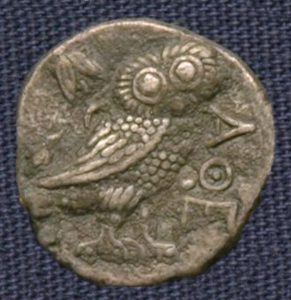
Despite the advancements and cultural flourishing of Archaic Greece, the institution of slavery played a significant role in the economy and society of the time. Slavery was widespread, with many households depending on enslaved individuals for labor. Enslaved people worked in various capacities, including domestic service, agriculture, and skilled trades. They were often prisoners of war or born into slavery, with little to no rights or autonomy. The reliance on enslaved labor allowed the elite to enjoy greater leisure and participation in political life, while the harsh realities of slavery often remained hidden from public view. This dark aspect of Greek society underscores the complexities of its civilization, highlighting that the achievements of the period were built, in part, on the suffering and exploitation of many.
Sparta
The city-state of Sparta emerged in the 8th century BCE, comprising five villages in the Laconia region of southern Greece. Due to the scarcity of arable land, Spartan citizens were required to serve in the military, engaging in conflicts with neighboring towns and enslaving their inhabitants, known as helots. The conquered territories were distributed equally among Spartan citizens, with helot families forced to work the land. By the 7th century BCE, Sparta had expanded its dominion over Messene. The Spartan government was characterized by a unique constitutional system, allegedly established by Lycurgus around 800 BCE.
Sparta’s influence extended beyond its borders through the Peloponnesian League, a network of alliances formed in the 6th century BCE. Member states retained autonomy but aligned their foreign policies with Sparta’s. The Spartan government consisted of two hereditary kings, a Council of Elders, and an Assembly of citizens. The Assembly held legislative power, while the Council provided counsel. Five elected judges oversaw administrative affairs. Spartan culture emphasized rigorous education, known as the agoge, which began at age seven and prepared males for warfare.
Spartan men underwent intensive military training from ages 18 to 20. Women of the warrior class engaged in physical training and managed estates while men were at war. Unmarried women participated in religious festivals as chorai. At 30, Spartan men could marry, vote, and serve as judges. They remained in the military reserve until 60, when they became eligible for the Council of Elders. Spartan citizens dedicated themselves to military and governmental service, relying on helots and commoners for labor. This distinctive social hierarchy and educational system fostered a society renowned for its discipline and martial prowess.
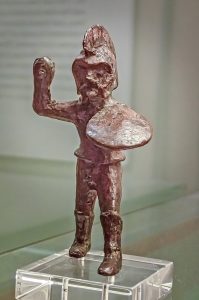
In ancient Sparta, women’s lives were significantly shaped by the city-state’s militaristic and patriarchal system. Unlike their counterparts in many other Greek city-states, Spartan women enjoyed a relatively high degree of freedom and independence. While their husbands were away at war, they managed households and estates and were encouraged to participate in physical exercise and sports to ensure they bore strong and healthy children. Spartan women received education in music, dance, and poetry and played active roles in religious festivals and ceremonies. Nevertheless, their primary responsibilities remained centered around childrearing and domestic duties. From an early age, girls were trained in household skills and physical fitness, often marrying between the ages of 14 and 18 to men who were frequently twice their age. Despite these constraints, Spartan women were known for their assertiveness and substantial influence in family matters. The famous phrase “Come back with your shield or on it” reflects the stoic and courageous ideals expected of Spartan women, emphasizing the societal pressure on mothers to raise sons who would become warriors.
Athens
Athens, unlike other Greek city-states, developed a unique system of governance during the Archaic period, eventually becoming a powerful limited democracy where all adult male citizens could participate. However, citizenship was restricted to free males, excluding women and slaves, which underscores the system’s limitations. Athens’ geographic advantages, including its large size and control over the fertile mountain valleys of Attica, significantly contributed to its growth. By the seventh century BCE, Athens had established an assembly that allowed male citizens to discuss state affairs, although economic hardship raised concerns about the sustainability of its early political structure.
The roots of Athenian governance run deep, with its institutions evolving over several centuries. Increasing prosperity in the eighth century BCE spurred demands for broader participation in governance. Yet, by the end of that century, economic challenges threatened the system’s viability.
Attempts to solve the economic problems by adjusting the legal code, most notably by the legislator Draco (from whose name we get the modern term “draconian”), had little effect, though codifying the law in written form brought more clarity to the legal system. With the once-thriving middle class slipping into bankruptcy and sometimes slavery, civil war seemed inevitable. Disaster was avoided only with the appointment of Solon in 594 BCE to restore order. Solon’s reforms included the cancellation of debts, a ban on debt slavery, and the establishment of the Council of Four Hundred and jury courts. Government positions were based on wealth rather than hereditary privilege. Despite these changes, civil unrest continued.

Pisistratus, a relative of Solon, seized power in 545 BCE and ruled as a popular tyrant, maintaining many of Solon’s reforms while promoting self-governance. The death of Pisistratus led to the rise of his sons, who struggled to maintain their power. Cleisthenes, an Athenian aristocrat, played a crucial role in persuading the Spartans to overthrow them and reestablish a more inclusive political structure. He reformed the system by replacing the Council of Four Hundred with one of five hundred and reorganizing Athens into ten tribes. Each tribe selected fifty members for the new Council, fostering unity among Athenians and promoting political cooperation.
By the end of the Archaic period, Athens had developed a functioning although limited direct democracy (which differs from modern republics in which citizens vote for representatives who sit in the legislatures). All male citizens could sit in the Athenian Assembly, which met at least ten times a year. All laws had to be approved by the Assembly. Only the Assembly could declare war and approve treaties. Athens had a citizen body of thirty to forty thousand adult males in the Classical period, but only six thousand needed to convene for meetings of the Assembly. Citizens could also be chosen by lot to sit in the Council. Since they were permitted to serve for just two one-year terms over a lifetime, many male Athenians had the opportunity to participate in the executive branch of government. All male citizens also served on juries, which not only determined the guilt or innocence of the accused but also interpreted the way the law was applied. However, women, enslaved people, and foreign residents could not participate.
In ancient Athens, women’s lives were severely circumscribed by societal norms that emphasized domesticity. As custodians of the household, women from citizen families managed domestic affairs, supervised slaves, and prioritized child rearing. Their education was limited to domestic skills, music, and weaving, and they were largely excluded from public life, politics, and intellectual pursuits. Lacking autonomy and property rights, women’s lives were governed by patriarchal authority, with fathers and husbands wielding control over their marriages, households, and futures. While some exceptional women, such as Aspasia and Sappho, achieved recognition through their intellect and artistic talents, the prevailing ideal of gynaikeion arete (womanly virtue) stressed modesty, obedience, and domestic conformity.
Classical Greece
The Greek Classical period (500–323 BCE) was an era of great cultural achievement in which enduring art, literature, and schools of philosophy were created. It began with the Greek city-states uniting temporarily to face an invasion by the mighty Persian Empire, but it ended with them locked in recurring conflicts and ultimately losing their independence, first to Persia and later to Macedon.
The Persian Wars (492–449 BCE) were a struggle between the Greek city-states and the expanding Persian Empire. In the mid-sixth century BCE, during the reign of Cyrus the Great, Persian armies subdued the Greek city-states of Ionia, located across the Aegean from Greece in western Asia Minor (Turkey). To govern the cities, the Persians installed tyrants recruited from the local Greek population. The resident Greeks were unhappy with the tyrants’ rule, and in 499 BCE they rose in the Ionian Rebellion, joined by Athens and the Greek cities on the island of Cyprus. But by 494 BCE Persian forces had crushed the rebellions in both Ionia and Cyprus. For intervening in Persian affairs, the Persian king Darius decided that Athens must be punished.
In 490 BCE, Persian King Darius launched an ambitious campaign to conquer Athens and reinstate tyranny. The Persians landed at Marathon, outnumbering the Athenians, but the Athenian army’s determination to defend their democratic ideals proved decisive. Despite being outnumbered, the Athenians’ spirited charge overwhelmed the Persians, forcing them to retreat. This pivotal defeat prompted the Persians to withdraw to Asia Minor.
A decade later, Darius’s son Xerxes sought vengeance, mobilizing a massive force to conquer Greece. The Greek city-states formed the Hellenic League, unifying under Spartan leadership on land and Athenian command at sea. After a valiant stand at Thermopylae, the Persians pressed on toward Athens, but the Athenian navy secured a decisive victory at the Battle of Salamis, decimating the Persian fleet. In 479 BCE, the Spartans decisively defeated the Persians at the Battle of Plataea, effectively ending Xerxes’s Greek ambitions. This series of victories ensured the preservation of Greek independence and democracy.
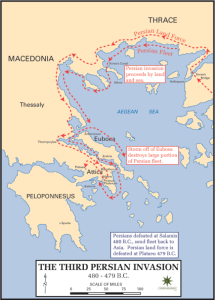
After the Persian Wars, Athens emerged as a dominant force, seeking to liberate all Greek city-states. In 477 BCE, the Delian League was formed, an alliance of city-states with its headquarters on the Aegean island of Delos. Members contributed ships, troops, or funds to equip the Athenian fleet. By 449 BCE, Athens and Persia reached a peace settlement, recognizing Ionia’s independence and Athens’ non-interference in the Persian Empire.
The Delian League’s wealth enriched many lower-class Athenians, who found employment as rowers or received compensation for jury duty and Assembly meetings. However, the league’s transformation into an empire, with subject states paying tribute to Athens, alarmed other city-states. In 465 BCE, Athens forced Thasos to rejoin the league, and by 437 BCE, tribute funds rebuilt temples on the Acropolis, including the Parthenon. These symbols of Athenian pride and architectural achievement also represented arrogance and domination to subject city-states.
Athens’ growing power concerned the Spartans, who viewed themselves as Greece’s premier city-state. This rivalry escalated into the Peloponnesian War in 431 BCE. Pericles’ defensive strategy initially succeeded, culminating in the Peace of Nicias in 421 BCE. However, the war took a heavy toll, including a devastating plague in 426 BCE that claimed Pericles’ life.
The war’s conclusion left Sparta dominant, establishing oligarchies in former democratic city-states and instituting the Thirty Tyrants in Athens. Sparta’s reneging on its promise to restore Ionian cities to Persian control prompted Persian-funded resistance. Thebes’ victory over Sparta at the Battle of Leuctra in 371 BCE liberated Messene and weakened Sparta’s military system. By 350 BCE, the Greek city-states were economically and politically exhausted from relentless warfare.
The Classical “Golden Age”
The Golden Age of Greece, which lasted from 479 to 431 BCE, marked a high point of cultural, philosophical, and artistic achievement that significantly shaped Western civilization. Under the leadership of Pericles, Athens entered a transformative period characterized by remarkable growth and development. The formation of the Delian League in 477 BCE played a crucial role in this, providing Athens with substantial resources collected from its allied city-states. These resources allowed for the construction of iconic landmarks like the Parthenon and the rebuilding of the Acropolis, which had been damaged during the Persian invasions. This era of prosperity also created a vibrant environment where the arts and intellectual pursuits flourished, establishing Athens as the cultural epicenter of Greece.
During the Golden Age, several influential philosophers emerged, including Socrates, Plato, and Aristotle, whose ideas laid the groundwork for Western thought. Socrates introduced a method of questioning and dialogue that encouraged people to think critically about their beliefs and values. His teachings continued through Plato, who founded the Academy in Athens, an important center for intellectual exploration. Plato’s writings examined concepts like justice, beauty, and the nature of reality, influencing generations of thinkers. Aristotle, a student of Plato, made significant contributions across many fields, including ethics, politics, and natural sciences. Together, these philosophers established foundational principles of Western philosophy, which remain relevant in today’s discussions about morality, governance, and knowledge.
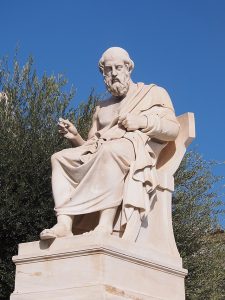
The Golden Age also saw the flourishing of Athenian drama, which became a vital aspect of Greek culture. Playwrights such as Aeschylus, Sophocles, and Euripides created powerful tragedies that explored complex human emotions and ethical dilemmas. Their works often reflected the values and challenges of Athenian society, prompting audiences to consider profound questions about fate, free will, and justice. The theatrical festivals held in honor of Dionysus became significant cultural events, showcasing not only the plays but also the talents of actors and directors. This vibrant theatrical tradition laid the foundation for future literary forms and made Athenian drama a cornerstone of Western literature. In addition, the period saw remarkable advancements in science and mathematics, with scholars like Pythagoras and Hippocrates making groundbreaking discoveries that transformed their fields.
Link to Learning
For an example of Greek theatre, watch this modern performance of Lysistrata (https://openstax.org/l/ 77Lysistrata) by the comic poet Aristophanes. In this comedy, first performed in 411 BCE, the women of Greece plot to end the Peloponnesian War. In the Greek original, the actors would have worn masks and sung their parts, as in a modern opera.
In the realm of visual arts, the Golden Age was characterized by exceptional achievements in sculpture and architecture. Artists like Phidias and Myron produced iconic sculptures that celebrated the ideals of beauty and human form, often depicting gods and heroes from Greek mythology. The advancement of red-figure and black-figure pottery techniques allowed artisans to create intricate vessels adorned with scenes from mythology and everyday life. Architecture reached new heights, with monumental structures like the Stoa of Attalos and the Temple of Olympian Zeus showcasing innovative design and grandeur. The artistic endeavors of this period not only enriched Athenian culture but also set standards of beauty and craftsmanship that would resonate for centuries. The lively cultural environment of Athens encouraged citizens to engage in discussions about politics, philosophy, and the arts, fostering a community deeply invested in intellectual and creative pursuits.
Core Impact: Persuasion
Core Impact Skill: Persuasion
As you reflect on the artistic achievements of Athens during its Golden Age, consider how visual art functioned as more than just decoration—it was a persuasive force that shaped public ideals, reinforced civic values, and communicated messages of power, beauty, and identity. What did it mean for a society to place gods, heroes, and athletic bodies at the center of its visual culture? How did architecture, sculpture, and pottery shape what Athenians believed about themselves and their place in the world?
Persuasion helps you explore these questions by showing how the arts were used to influence minds, inspire loyalty, and express collective values. The masterpieces of Phidias and Myron, the storytelling on red-figure pottery, and the grandeur of buildings like the Stoa of Attalos were not just artistic feats—they were carefully crafted messages.
-
How did sculptures of gods and heroes shape public ideas of virtue, strength, and beauty?
-
How did monumental buildings persuade citizens and visitors of Athens’s power and cultural superiority?
-
How did everyday pottery convey values and expectations through scenes of myth and daily life?
By studying how art communicated values and inspired civic pride, you are learning to recognize persuasion in visual form. That’s the heart of persuasion—not just in words, but in images, symbols, and public spaces.
The study of history also evolved during the Golden Age. Herodotus and Thucydides are considered the first true historians because they examined the past to rationally explain the causes and effects of human actions. Herodotus wrote a sweeping history of wide geographic scope, called Histories (“inquiries”), to explore the deep origins of the tension between the Persian and Greek worlds. In History of the Peloponnesian War, Thucydides employed objectivity to explain the politics, events, and brutality of the conflict in a way that is similar in some respects to the approach of modern historians.
Finally, this period saw masterpieces of sculpture, vase painting, and architecture. Classical Age Greek artists broke free of the heavily stylized and two-dimensional art of Egypt and the Levant, which had inspired Greek geometric forms, and produced their own uniquely realistic styles that aimed to capture in art the ideal human form. Centuries later, and especially during the European Renaissance, artists modeled their own works on these classical models.
Despite its many achievements, the Golden Age faced significant challenges, especially with the onset of the Peloponnesian War in 431 BCE, which disrupted this period of prosperity. The conflict between Athens and Sparta marked a crucial turning point, leading to widespread devastation and strife that weakened the unity of Greek city-states. As the war dragged on, Athens experienced social and political turmoil, undermining the democratic ideals that had thrived during the Golden Age. Nevertheless, the legacy of this era endured long after its decline, profoundly shaping Western civilization and inspiring future generations. The ideals of allowing citizens to have a say in the way their government is run, the value of intellectual curiosity, and the importance of free artistic expression that emerged during the Golden Age continue to resonate in contemporary culture, making it one of the most pivotal moments in human history. The achievements of this time serve as a reminder of the enduring potential of human creativity and thought to influence society and inspire progress across generations.
Alexander the Great and Hellenism
The Classical period in Greece ended when Greece lost its freedom to the Kingdom of Macedon and Macedon’s king Alexander the Great conquered the Persian Empire. The period that followed Alexander’s death is known as the Hellenistic period (323–31 BCE). Alexander’s empire was divided among his top generals, including Seleucus, Ptolemy, and Antigonus. During this time, Greeks, also called Hellenes, ruled over and interacted with the populations of the former Persian Empire. The resulting mixture of cultures was neither Greek nor non-Greek but “Greek-like,” or Hellenistic, a term that refers to the flourishing and expansion of Greek language and culture throughout the Mediterranean and Near East during this period.
Alexander the Great, born in 356 BCE in Pella, Macedonia, expanded his empire through conquests that had far-reaching impacts. He became king in 336 BCE after the assassination of his father, King Philip II, and his military campaigns, which lasted until his death in 323 BCE, stretched from Greece to Egypt and into Persia, leaving diverse cultures and empires in his wake. While Alexander’s military prowess and cultural achievements are well-documented, his legacy is complex and multifaceted. From a Greek perspective, he spread Hellenistic culture, philosophy, and art, establishing cities like Alexandria as centers of learning and cultural exchange. However, from the perspective of the conquered peoples, his campaigns brought destruction, displacement, and cultural erasure. This duality helps explain why he is celebrated as “Alexander the Great” in Western cultures but often viewed negatively in Persian culture, where he is referred to as “Alexander the Demon.”
The Persian Empire, under the Achaemenid dynasty, had been a sophisticated and tolerant civilization that stretched from modern-day Iran to Egypt. Alexander’s conquests led to the destruction of this empire, imposing Greek culture and governance on its territories. Similarly, ancient civilizations in Mesopotamia, Babylon, and Persepolis suffered devastation and cultural suppression during his campaigns. While he spread Hellenistic culture, the methods of his conquests often inflicted suffering on those who resisted, highlighting the darker aspects of his legacy.
Alexander’s sudden death in 323 BCE at the age of 32 in Babylon sparked a power struggle among his generals, known as the Diadochi. These struggles resulted in the Wars of the Diadochi, which fragmented his empire into smaller kingdoms, including the Seleucid Empire, the Ptolemaic Kingdom of Egypt, and the Antigonid dynasty in Macedonia, perpetuating conflict and instability. The long-term impact of Alexander’s conquests remains debated. While they facilitated cultural exchange and spread Greek knowledge, they also imposed Greek dominance over indigenous cultures, suppressing local traditions and identities. This complex legacy continues to shape historical narratives and cultural identities today, reflecting the enduring influence of Alexander’s ambition and the consequences of his empire’s expansion.
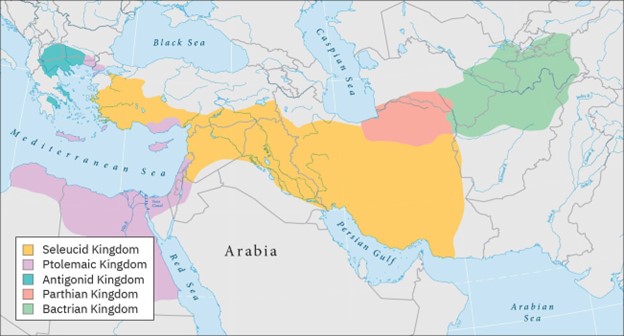
The Hellenistic period, following Alexander the Great’s conquests, was marked by the blending of Greek and other cultures within the former Persian Empire. Greek cities, founded by Alexander and subsequent Hellenistic kings, were established for Greek and Macedonian colonists, incorporating institutions like temples, theaters, and gymnasia. Notable cities included Alexandria in Egypt, Antioch in southeastern Turkey, and Ai Khanum in modern Afghanistan. These urban centers became melting pots, integrating Greek-speaking populations with indigenous peoples. Cultural exchange flourished, with the establishment of institutions like the Museon and the Alexandrian Library.
As Greek city-states lost their independence under Hellenistic kingdoms, the focus shifted from political engagement to personal happiness. This transformation was influenced by the changing political landscape and the fragmentation of the once unified Greek city-states. New religions and philosophies emerged, blending Greek and non-Greek elements. Stoicism, founded by Zeno in the early 3rd century BCE, emphasized the acceptance of fate and the development of self-control and resilience to overcome destructive emotions, promoting a sense of internal peace. Meanwhile, Epicureanism, founded earlier by Epicurus in the 4th century BCE, became influential during the Hellenistic period, advocating the pursuit of pleasure and the avoidance of pain, encouraging followers to seek both physical and intellectual pleasures. These philosophical schools, taught in Athens and other Hellenistic cities, offered paths to happiness in a rapidly changing world.
